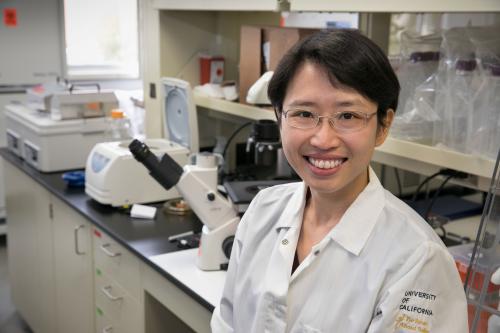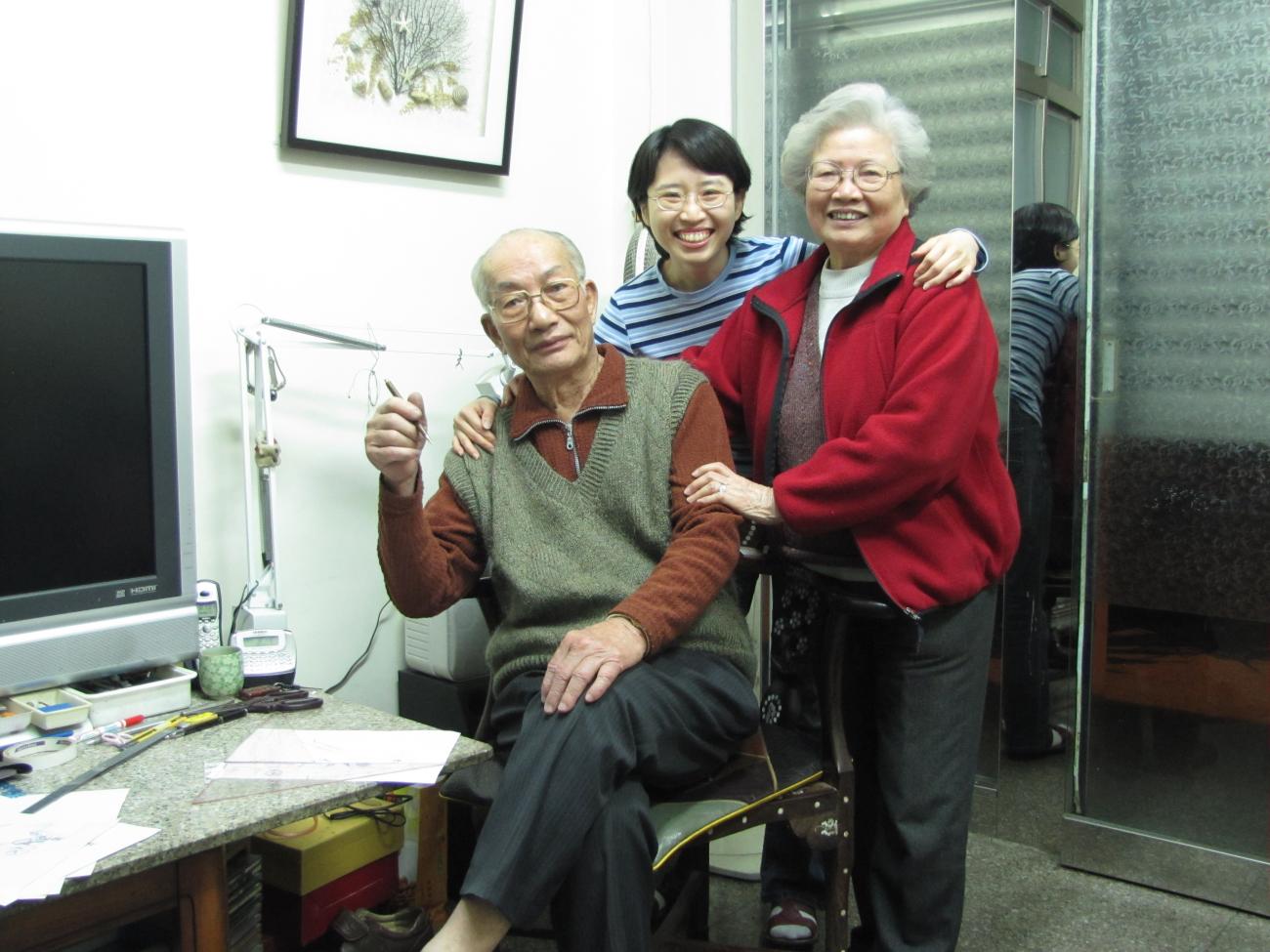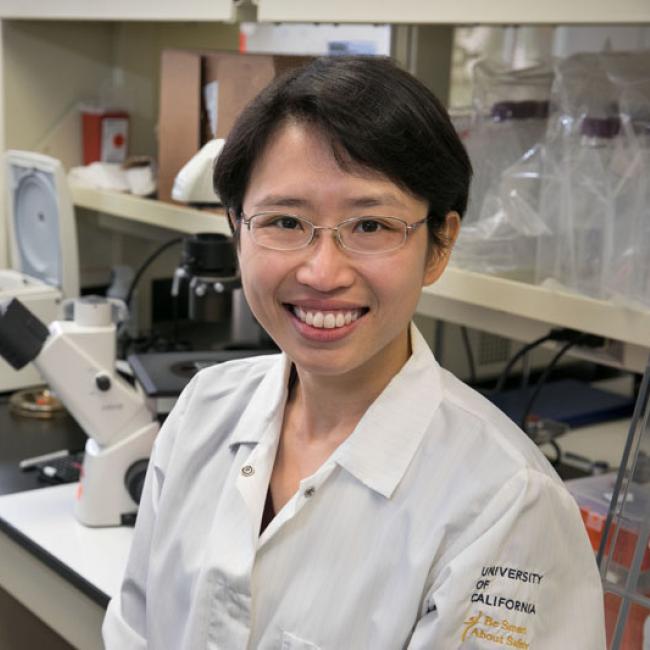
Member Spotlight: Yvonne Chen is engineering ‘stronger and smarter’ CAR-T cells to better fight cancer
Meet Yvonne Chen, PhD, who designs novel strategies to make CAR-T cell immunotherapies safer and more effective for cancer treatment. Here, she talks about leading a promising clinical trial for patients with lymphoma, her first time meeting a patient who benefitted from her work and how karaoke has allowed her to connect with her grandparents and mother tongue.
Chen is an associate professor of microbiology, immunology and molecular genetics in the UCLA College and of chemical and biomolecular engineering at the UCLA Samueli School of Engineering. She also serves as the co-director of the UCLA Jonsson Comprehensive Cancer Center Tumor Immunology and Immunotherapy Program and is a member of the of the Eli and Edythe Broad Center of Regenerative Medicine and Stem Cell Research at UCLA.
Tell us about your research.
Our lab focuses on engineering CAR-T cell therapies, a type of treatment in which a patient’s own immune cells called T cells are programmed to attack tumor cells. T cells are taken from a patient’s blood, modified with a special cancer-recognizing receptor called a chimeric antigen receptor, or CAR, and then given back to the patient by infusion. This type of cell therapy has revolutionized cancer care, but challenges remain, in part because tumors have various ways to defend themselves such as by losing the specific antigen that’s targeted by the T cell.
Our ultimate goal is to engineer the T cells to be smarter and stronger to overcome these defense mechanisms and prevent side effects associated with CAR-T cell therapy. For example, our team designed a bispecific CAR that targets two different antigens found on the surface of lymphoma cells: CD19 and CD20. This approach equips T cells to launch a bilateral attack, meaning the tumor would have to lose both of the antigens to successfully escape, making it much more difficult for the tumor to evade therapy.
This technology is being evaluated in an ongoing Phase 1 clinical trial I’m co-leading with Dr. Sarah Larson. Of the 11 patients with non-Hodgkin’s lymphoma we’ve treated, 10 responded to the treatment and eight achieved a complete response, meaning each of their tumors completely went away. The technology has now been licensed to a company called ImmPACT Bio and they have now started their own multi-site clinical trial with UCLA being the first site. I’m hopeful this larger-scale clinical trial will allow our technology to help more patients in need. In the meantime, our team is now developing dual target CAR-T cell therapies for patients with multiple myeloma and glioblastoma.
How has being a UCLA Broad Stem Cell Research Center member helped you as a scientist?
Not long after I arrived at UCLA in 2013, Dr. Donald Kohn invited me to join a group meeting with several principal investigators who had been funded by the Center through an Innovation Award. In a lot of ways, this access to kind and collaborative colleagues was the best thing that could’ve happened to me. I’m trained as a chemical engineer. I never got formal training in immunology, so a lot of what I learned about the field was just from listening to colleagues share unpublished data and suggestions with each other. The fact that a chemical engineer like me managed to get an Investigational New Drug Application approved to initiate and eventually run a clinical trial is in large part because we have people on campus like Dr. Kohn, Dr. Antoni Ribas and Dr. Owen Witte—people who are willing to share their protocols, experience and sometimes even their staff. The success that I’ve achieved is a direct reflection of the supportive community the BSCRC has fostered.
Have you always wanted to be a scientist?
Actually, my best friend from childhood just sent me a bunch of things she found of mine that she had kept. One of the items was a survey we filled out in seventh grade that asked questions like “Who’s your best friend?” and “How’s your relationship with your parents?” I had written that I wanted to become a great researcher in response to “What do you want to be when you grow up?” Part of this early realization can probably be traced back to the environment I was raised in. My dad was a chemical engineer, my mom was a textile science major and my grandfather held several patents for new machines he invented. On a more practical level, I figured that even if I wasn’t extraordinary, becoming a scientist would allow me to work on projects that contribute substantively to society.
What motivates you to pursue your research?
The honest answer is I don’t like losing, and I want to figure things out. Sometimes, a problem can be solved if you just think deeper, work harder and try more solutions. Other times, you have to learn when to pivot and adopt a new approach. Patience, perseverance and flexibility are all skills you need to develop as a researcher.
On a more philosophical level, it’s a real privilege to be given the space and resources to think about interesting questions and ways to answer those questions. Not a lot of people get to do this and not a lot of countries are positioned to help us advance the questions that we’re asking. I also teach my students that if you’re tackling a difficult problem, you’re going to fail many times before you succeed. You need time and sometimes luck to get something to work, but that’s what makes this career exciting.
Where and when are you the happiest?
At work, two things immediately come to mind. I enjoy advising undergrads. I feel that undergrads nowadays are under a tremendous amount of stress, so it’s really rewarding to be able to help them think through what’s truly important versus what are things that feel like a big deal now but may just be transient.
I’m also happy when we actually get things to work. It’s a fantastic feeling when we run a clinical trial that results in patients living longer. I had the opportunity to meet a patient who was enrolled in our clinical trial for non-Hodgkin’s lymphoma. He and his wife came to one of our group meetings and met all the students in the group, as well as the staff who made the cell products for him. To see that something we worked on translated into actual benefit for a human being—that moment was so special for everyone involved and it certainly was a career highlight for me.
Outside of work, I’m happiest when I’m outdoors, trying out new recipes and reading history books. I actually double minored in Japanese and classics. If I hadn’t pursued science, I most likely would’ve pursued a career in history because I enjoy learning about human behavior and how a society or culture functions.
What’s something most people might not know about you?
I really enjoy hanging out with people who are much older than me and listening to the stories they have to tell. It’s the best kind of history lesson. I grew up with my grandparents in Taiwan and still talk to my 96-year-old grandpa every week. I also learn a lot by singing karaoke with my grandparents and the whole family, which explains why my go-to karaoke songs are mostly from the 1990s or older. Singing together is a fun way to connect, and I’ve learned much of my Taiwanese from listening to karaoke and watching Taiwanese opera, which probably sounds bizarre to most people my age.

